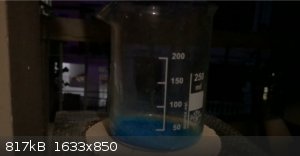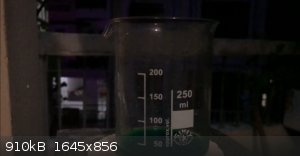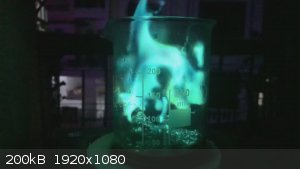Tonytran88
Harmless

Posts: 1
Registered: 1-12-2019
Location: Ho Chi Minh City, Vietnam
Member Is Offline
|
|
Tips on filming reactions with a phone?
Hi all,
I'm looking to film some of my chemistry with my mobile phone for school projects. I have a crappy Chinese tri-pod that is part of a selfie stick, but
it's a little bit wobbly and unreliable. I've attached some frames of one of my already-made videos, it's doesn't really look good
Any tips would be appreciated!
  
|
|
|
Sulaiman
International Hazard
    
Posts: 3736
Registered: 8-2-2015
Location: 3rd rock from the sun
Member Is Online
|
|
I am not expert but I'm sure that good lighting helps a lot.
CAUTION : Hobby Chemist, not Professional or even Amateur
|
|
|
Fyndium
International Hazard
    
Posts: 1192
Registered: 12-7-2020
Location: Not in USA
Member Is Offline
|
|
Since the sensor is very small, a good light source is needed, unless you use long exposure times. Then the rigidity of the stand is pronounced. I
suggest getting a less-shittier stand from bay/ali/wish/etc, I got a small handheld multi-purpose stand that is surprisingly rigid and cost only 5$ at
the time.
I'm not sure but likely phones should have timelapse modes.
|
|
|
j_sum1
Administrator
       
Posts: 6338
Registered: 4-10-2014
Location: At home
Member Is Offline
Mood: Most of the ducks are in a row
|
|
Phones can have surprisingly good optics and ccd's.
I have filmed extensively with my 5 year old oppo and it does a great job: better than any other camera I have atm.
You do need to hold it steady. Hand held does not work, although you may have some success with a slow pan.
Good light is essential. Experiment with light sources until you get it right.
You need to get in close and low. Looking directly down into a beaker or flask is usually unsatisfactory to watch. A three quarter view is worse. On
the level with your glassware is best.
Colours sometimes do not work out. The vivid coliurs in Chemistry often come from quite spiky spectra. And if the wavelengths produced do not align
with the camera sensors, you get untrue coloration. Again, phones can actually be quite good here. But something to be aware of.
|
|
|
woelen
Super Administrator
        
Posts: 8032
Registered: 20-8-2005
Location: Netherlands
Member Is Offline
Mood: interested
|
|
Good lighting is the key to good photos and videos.
Good cameras are a pre, but not a requirement. Even with mediocre cameras you can make good videos, but only if lighting is good. With bad lighting
you get bad videos even with good cameras.
I put quite some effort in making a setup for good lightling. I used multiple LED strips from different directions to get uniform lighting, but I can
switch off sections if I want light from one side. I also have white backgrounds, black backgrounds and backgrounds with lines and squares. Which
background I use depends on the type of chemical or reaction. Sometimes it is a matter of experimenting and making two or three videos of the same
reaction with different backgrounds.
Making a decent construction for your smartphone, so that it can be kept stable also helps, but many good photos can even be made from your hands if
you have good lighting.
[Edited on 16-10-21 by woelen]
|
|
|
DraconicAcid
International Hazard
    
Posts: 4360
Registered: 1-2-2013
Location: The tiniest college campus ever....
Member Is Offline
Mood: Semi-victorious.
|
|
I use a lab stand and a clamp to hold my phone for recording videos.
Please remember: "Filtrate" is not a verb.
Write up your lab reports the way your instructor wants them, not the way your ex-instructor wants them.
|
|
|
mayko
International Hazard
    
Posts: 1218
Registered: 17-1-2013
Location: Carrboro, NC
Member Is Offline
Mood: anomalous (Euclid class)
|
|
Lighting, background, and stability have already been mentioned; there's also composition of the shot to think about. Just paying attention to the rule of thirds will get you a long way, especially with relatively static subjects like chemistry. More important though is remembering to
take the time to stop what you're doing and LOOK at the shot. This is harder than it sounds, since you're often preoccupied with the reaction, and
it's like editing your own writing. One thing that's easy to miss is if your subject isn't fully in the frame; in the stills you showed, the
top/bottom of the beaker gets clipped in a way that's visually awkward.
For phone cameras in particular, the still and video are sometimes taken from slightly different angles, or with different resolutions. This means
that if you set up the shot in photo mode, and then start recording video, the perspective might be slightly off. Some phones show this change
on-screen when you switch modes, but I had one that didn't. Before I realized what was going on, I spent several frustrated editing sessions, going
through footage and wondering why it was all so hideous 
al-khemie is not a terrorist organization
"Chemicals, chemicals... I need chemicals!" - George Hayduke
"Wubbalubba dub-dub!" - Rick Sanchez
|
|
|
Fryd_Socks
Harmless

Posts: 1
Registered: 10-9-2019
Location: The Nothing Belt (Midwest.)
Member Is Offline
Mood: Dreaming or Delusional
|
|
This is something I should make note of. I haven't bothered to get me a tripod yet. I usually throw my phone in a roll of duct tape to get it to stand
up.
|
|
|
woelen
Super Administrator
        
Posts: 8032
Registered: 20-8-2005
Location: Netherlands
Member Is Offline
Mood: interested
|
|
I made quite a few videos for my website and I can tell that making good videos is not that easy. Many times I have to repeat the reaction once or
twice. I look at the video, and then I see that something still is not OK, and then I make it again, adjusting things slightly.
Another tip: Make pictures or videos of just a little bit larger area than what you intend to show. Zoom out a factor of 1.4 or so. This gives you
some margin in the pictures and videos, and by cropping, the pictures or videos can be given a nice composition in many cases. You should not overdo,
zooming out too much results in loss of quality.
And remember: digital zoom is no zoom. Do not use that! Zooming can be done with the lens or with your legs, not digitally. If you really need to go
close to something and you can't get a sharp image, buy yourself a lens of +2 or +4 diopters. You can stick such a lens in front of your camera lens
if you have no real connector for attaching it. Even a cheap lens is much better than an out-of-focus image. I myself made many beautiful pictures on
my website with a cheap lens, put in front of my camera lens. With some fiddling, some tape and a little perseverance you can get amazing results
without needing expensive equipment.
I purchased these: https://www.kortingcamera.nl/close_up_filter_58mm_4_in_1_kit...
Very cheap, not the best, but I made many beautiful pictures with one of these. There are much better ones, but these have high prices. These cheap
ones also can be used on a smart phone with some tape and if you accidently spoil the coating of one, with droplets of acid or so, then there is no
real financial disaster.
The main issue with the cheaper lenses is so-called chromatic abberation (colored rims around objects), but if you make pictures of solid objects
against a lighter background, then you hardly notice this effect. If you make pictures of very thin, needle-like bright objects against a darker
background, then that effect can be annoying, but the majority of pictures you make will not be like that. Knowing the limitations of your equipment
also helps you make good pictures.
[Edited on 4-11-21 by woelen]
|
|
|
pneumatician
Hazard to Others
  
Posts: 412
Registered: 27-5-2013
Location: Magonia
Member Is Offline
Mood: ■■■■■■■■■■ INRI ■■■■■■■■■■ ** Igne Natura Renovatur Integra **
|
|
look in a option for overexpose the video, something like -3 -2 -1 0 +1 +2 +3 or use a higher ASA or use in light measure "central spot" if the
reaction or central action is in the center of the image, else, rent a pro video staff :-D
|
|
|